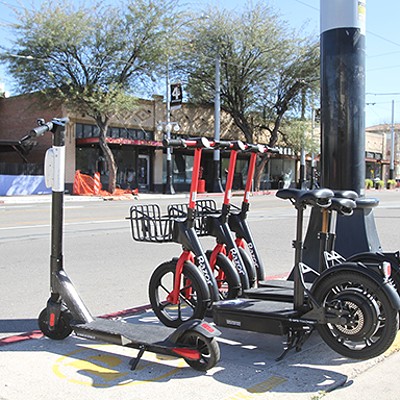Tucson City Council reduces the cost of parking tickets for metered spaces
Good news about parking downtown: The Tucson City Council took the first steps to reducing parking fines for when that darned meter runs out of time while your car is still in its spot.
The city's fines are absurdly steep. If you get ticketed at a metered spot, you owe $62.
Part of the reason that fines are so high: The state of Arizona takes a big piece of the action on the fees.
The city has found a way to reduce the fines, however, by eliminating a $20 "case processing fee." Since the state tacks on a $16.60 surcharge on the fee, getting rid of it means that parking tickets can be reduced significantly.
The new fee for a basic parking violation will drop from $62 to $40. Nuisance parking violations will drop from $85 to $60, safety parking violations will drop from $188 to $125 and people who park in handicapped spaces will see their fines drop from $562 to $400. (It should be noted that healthy individuals who park in handicapped spaces will still be going to hell when they die.)
The city was able to eliminate the case processing fee by turning over the responsibility of handling the tickets to ParkWise, the city's parking agency. But if you're late in paying the ticket, it gets turned over the courts and the fees start to stack up.
"If you don't pay right away and it becomes a court case, we still have a pretty high fine," said Councilman Paul Cunningham, who led the push for the lower fees.
Along with the good news comes some bad news: ParkWise wants to double the cost of parking meters, from $1 an hour to $2 an hour, and plans to start installing meters on Fourth Avenue.
Clearing the Record
State lawmaker proposes legislation to allow people who were convicted as minors to clear their criminal records
Beth Jacobs was forced into prostitution at age 16 and didn't get out of the life until she was 22.
The consequences continue to haunt her decades later.
After earning a degree in social work and working in the field for 15 years in Minnesota, Jacobs moved to Arizona and landed a job with the state as a sex-crimes investigator. But when state officials discovered her past convictions for prostitution, they fired her because she didn't disclose them when she applied for the job.
"I told them they were right, I didn't disclose because that happened to me 30 years ago," Jacob said. "I got the job in 2011 and I trafficked in the 1980s. The charges that got me fired were from 1980 to 1983. So even though 30 years went by and I've done a lot of good things, it didn't matter. The only thing they were worried about was that I had these charges, and because of those charges, I was terminated."
State Rep. Victoria Steele has a proposal that would make it easier for women who were forced into prostitution as minors to clear their records. Provided she wins reelection next week, she wants to introduce legislation that would allow people who have criminal records as minors to go before a judge and request that their convictions be vacated.
"As a child, you might have been forced into prostitution or theft or drug-related crimes," Steele said. "These convictions that were put on you during your teenage years should not follow you for the rest of your life."
The legislation wouldn't help Jacobs; her convictions were in Minnesota, not Arizona, and they occurred after she turned 18, so she wasn't a minor. But she and Steele said the proposed legislation was a start to helping people who made mistakes when they were young.
"It's a life sentence," Jacobs said. "I don't think I should have to tell everybody for the rest of my life. I haven't gotten into any other trouble. I just hope we can change this law because it's not fair. We should be able to pick ourselves up and dust ourselves off."
A Second Chance
City moves to "Ban the Box" on job applications
The Tucson City Council moved forward last week on a plan to "Ban the Box" on job applications for city employees.
"Ban the Box" is a nationwide campaign to remove the requirement that convicted felons check a box on their initial job application. The idea: To allow people who have made mistakes in their lives to make it past the initial round when applying for a job.
Ward 5 Councilman Richard Fimbres—who has worked for the Pima County Sheriff's Department and is a former military policeman—brought the proposal forward because he believes people deserve a second chance.
Andy Silverman, a UA law professor who spoke out in support of "Ban the Box" at the council meeting, said that checking the box often means not getting a job.
"What I hear a lot from our clients is that once they mark 'yes' on a job application that they have a criminal conviction, the hiring process for them ends," Silverman said. "They don't get callbacks, they don't get interviews. ... We know from studies that employment reduces recidivism. I'm sure that all of you are interested in reducing recidivism in our community. 'Ban the box' is a win-win for everyone."
There are many details yet to be worked out. City staff is going to come back with a proposed policy that will include what positions in the city would require a more thorough background check, how the city would gauge a record of rehabilitation, and whether there would be an appeals process for people who did not get a job after failing a background check.
Councilman Paul Cunningham, a former juvenile probation officer, said that he supported the policy.
"I think everybody's life is a series of second chances," Cunningham said.















